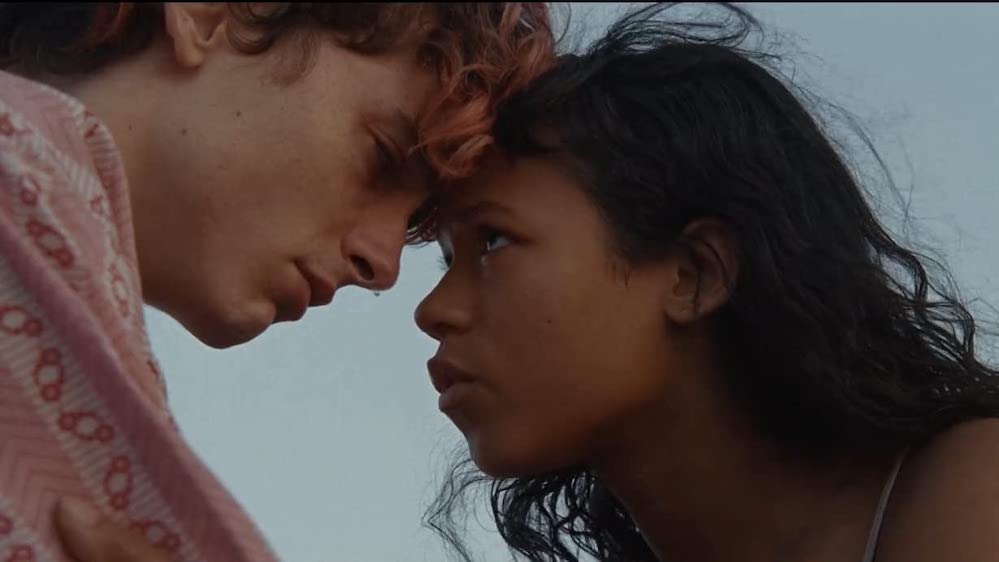Luca Guadagnino’s Bones and All is a spectacularly odd duck. A renowned director, one of the biggest movie stars on the planet, an arthouse gloss, and an absurdly stacked supporting cast all in service of an adaptation of a young adult novel about cannibals. It’s a modern prestige film on the surface that’s equal parts Badlands, Wrong Turn and Twilight.

This is a pure road trip movie about Maren (Taylor Russell) traveling across the American Midwest in order to find her mother who left her as a child after her father abandons her due to her insatiable hunger for human flesh. Along the way she meets Sully (Mark Rylance), who teaches her how to hone her cannibalistic instincts, and Lee (Timothée Chalamet), with whom she forms a romantic relationship. Maren and Lee travel together, stopping along the way to meet his sister, listen to music and consume dead bodies.
The central pairing of Russell and Chalamet (who also serves as a producer) anchors the film. The two are very underplayed, giving their burgeoning relationship a genuine feeling of two people feeling out their place in the universe and as a couple. The few moments where they let loose their emotions, be it their fights and embraces or simply Chalamet giddily singing and dancing along to “Lick it Up” by KISS, contrast perfectly with the general stolidness of their performances. This is also amplified by the more outlandish supporting performances, such as Michael Stuhlbarg and David Gordon Green as gay hillbilly cannibals who love to drink and listen to Dokken.

Mark Rylance’s Sully is far less successful in that regard. I can only describe his performance as a late-period Johnny Depp type performance with exaggerated physical affects, eccentric costumes and even a silly hat for good measure. His vocal register is practically just that of Herbert the Pervert from Family Guy. This is a trend of late for Rylance, who has spent practically his entire post-Oscar Hollywood career cashing checks in increasingly ridiculous roles like the fake-teeth clad tech billionaire in Don’t Look Up or the mop-topped tech billionaire in Ready Player One. He has developed an avant-garde acting sensibility for preposterous, capital-W-Wacky nonsense. He does, however, get one great moment midway through the film where Sully’s facade towards Maren drops and he’s allowed to find something real in the character, but everything before and after doesn’t live up to that.
The film’s use of cannibalism is also fascinating in comparison to the novel’s treatment of the subject. DeAngelis’s original story heavily leans into the act as a metaphor – whether that be youthful rebellion, lustful desire, or just as a way of depicting the disgusting nature of eating meat (DeAngelis’s novel was inspired by her veganism). Guadagnino’s film is much more muted towards the metaphor angle, merely leaving it as a slight commentary on partaking in the forbidden fruit. It’s a more literal adaptation, replacing some of the novel’s fantastical elements with a more grounded version of events – where the cannibals in the novel are borderline supernatural creatures, here they’re just people who have better senses of smell and get hungry for manflesh. Guadagnino is far more interested in goopy, gross blood and guts than he is something like the myth of the Wendigo.

Which isn’t to say Bones and All isn’t a beautiful film to look at. Guadagnino is nothing if not spectacular at his visual craft, whether it’s the bright, naturally gorgeous Italian countryside of Call Me By Your Name or the cold, bleakness of his remake of Suspiria (a film I admittedly don’t care for, but the aesthetic and visual palate are certainly not the issue). Here, he’s shooting the America midwest through the lens of a pair of outsiders driving across the outskirts of the heartland. Open plains, cornfields, carnivals, and seemingly endless rivers make up the landscape of Lee and Maren’s trip. Their stops are punctuated by run-down suburban diners, urban decay and dirty campgrounds. Even the gore, disgusting as it may be, is weirdly elegant in its own way.
There’s a meandering quality to the film, which in many ways is a feature not a bug. There does, at times, seem to lack a bit of inertia though. There is almost always an episodic quality to road films, and Bones and All is no exception. Bones and All is a far stranger and uncynical romantic entry to the genre than most, but the spirit of films like Pierrot le Fou, Bonnie and Clyde, and Natural Born Killers is here as well. The elements that work in this film are spectacular, which makes the parts that don’t work that much more difficult to swallow.







